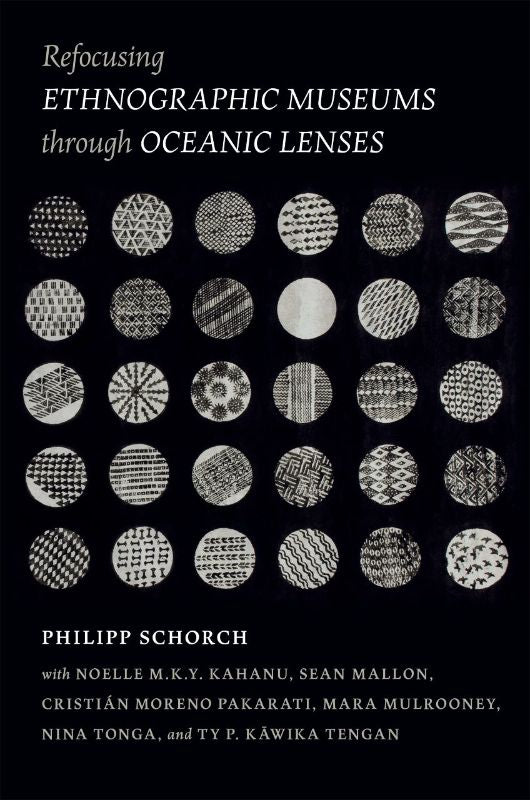Description
Discover 'Refocusing Ethnographic Museums Through Oceanic Lenses', an enlightening paperback authored by Philipp Schorch, published by Otago University Press. This 264-page book, measuring 150 x 230 mm, delves into a groundbreaking collaborative ethnographic investigation exploring Indigenous museum practices. With a keen focus on three pivotal Pacific museums at the corners of the Polynesian triangle—Bernice Pauahi Bishop Museum in Hawai'i, Museum of New Zealand Te Papa Tongarewa, and Museo Antropológico Padre Sebastián Englert in Rapa Nui—this book engages with the complexities of (post)colonial narratives and the evolving understanding of museum ethnographies. As Euro-American-centric views are challenged, Schorch presents a compelling dialogue between these viewpoints and Oceanic perspectives, enriching the reader's understanding of Indigenous epistemologies, ontologies, and cosmologies. This timely work reshapes public understandings of Pacific collections and the role of ethnographic museums, offering crucial insights to recalibrate the practices surrounding Indigenous museologies. By employing Oceanic lenses, it elevates the discourse around how collections are interpreted and presented within European and American (post)colonial contexts. Enhance your knowledge of contemporary museologies and cultural heritage with this essential read, perfect for scholars, students, and anyone interested in the intersection of anthropology and indigenous practices. Enjoy fast delivery for your copy, delivered directly to your doorstep, ensuring you can start your journey through Oceanic lenses without delay.
CONDITION: Brand New
Dimensions: 150 x 230 mm
Pages: 264
Bind: paperback
Author: PHILIPP SCHORCH Publisher: Otago University Press
Refocusing Ethnographic Museums through Oceanic Lenses offers a collaborative ethnographic investigation of Indigenous museum practices in three Pacific museums located at the corners of the so-called Polynesian triangle: Bernice Pauahi Bishop Museum, Hawaiâ€i; Museum of New Zealand Te Papa Tongarewa; and Museo AntropolĂłgico Padre Sebastián Englert, Rapa Nui. Since their inception, ethnographic museums have influenced academic and public imaginations of other cultural-geographic regions and as a result, Euro-Americentric projection of anthropological imaginations has come under intense pressure. At the same time, (post)colonial renegotiations in former European and American colonies have initiated dramatic changes to anthropological approaches through Indigenous museum practices. This book shapes a dialogue between Euro-Americentric myopia and Oceanic perspectives by offering historically informed, ethnographic insights into Indigenous museum practices grounded in Indigenous epistemologies, ontologies and cosmologies. In doing so, the book employs Oceanic lenses that help to reframe Pacific collections in, and the production of public understandings through, ethnographic museums in Europe and the Americas. Following this line of reasoning, Refocusing Ethnographic Museums sets out to offer insights into Indigenous museologies across Oceania to recalibrate ethnographic museums, collections and practices through Indigenous Oceanic approaches and perspectives. This, in turn, should assist a
CONDITION: Brand New
Dimensions: 150 x 230 mm
Pages: 264
Bind: paperback
Author: PHILIPP SCHORCH Publisher: Otago University Press
Refocusing Ethnographic Museums through Oceanic Lenses offers a collaborative ethnographic investigation of Indigenous museum practices in three Pacific museums located at the corners of the so-called Polynesian triangle: Bernice Pauahi Bishop Museum, Hawaiâ€i; Museum of New Zealand Te Papa Tongarewa; and Museo AntropolĂłgico Padre Sebastián Englert, Rapa Nui. Since their inception, ethnographic museums have influenced academic and public imaginations of other cultural-geographic regions and as a result, Euro-Americentric projection of anthropological imaginations has come under intense pressure. At the same time, (post)colonial renegotiations in former European and American colonies have initiated dramatic changes to anthropological approaches through Indigenous museum practices. This book shapes a dialogue between Euro-Americentric myopia and Oceanic perspectives by offering historically informed, ethnographic insights into Indigenous museum practices grounded in Indigenous epistemologies, ontologies and cosmologies. In doing so, the book employs Oceanic lenses that help to reframe Pacific collections in, and the production of public understandings through, ethnographic museums in Europe and the Americas. Following this line of reasoning, Refocusing Ethnographic Museums sets out to offer insights into Indigenous museologies across Oceania to recalibrate ethnographic museums, collections and practices through Indigenous Oceanic approaches and perspectives. This, in turn, should assist a

